Are pitbull dogs good with cats? Have you ever wondered if pitbulls make good companions for cats? It’s such an interesting topic because there are so many myths and misconceptions floating around.
A big misconception about pitbulls and cats is that people often think pitbulls are automatically aggressive towards cats because of their history.
It’s like assuming all people from a certain background are the same. It’s just not true! Each dog is unique, and with the right training and introduction, many Pitbulls can actually get along well with cats.
It’s all about giving them a fair chance and understanding their individual personalities. Let’s delve in.
Can Pitbulls Get Along with Cats?
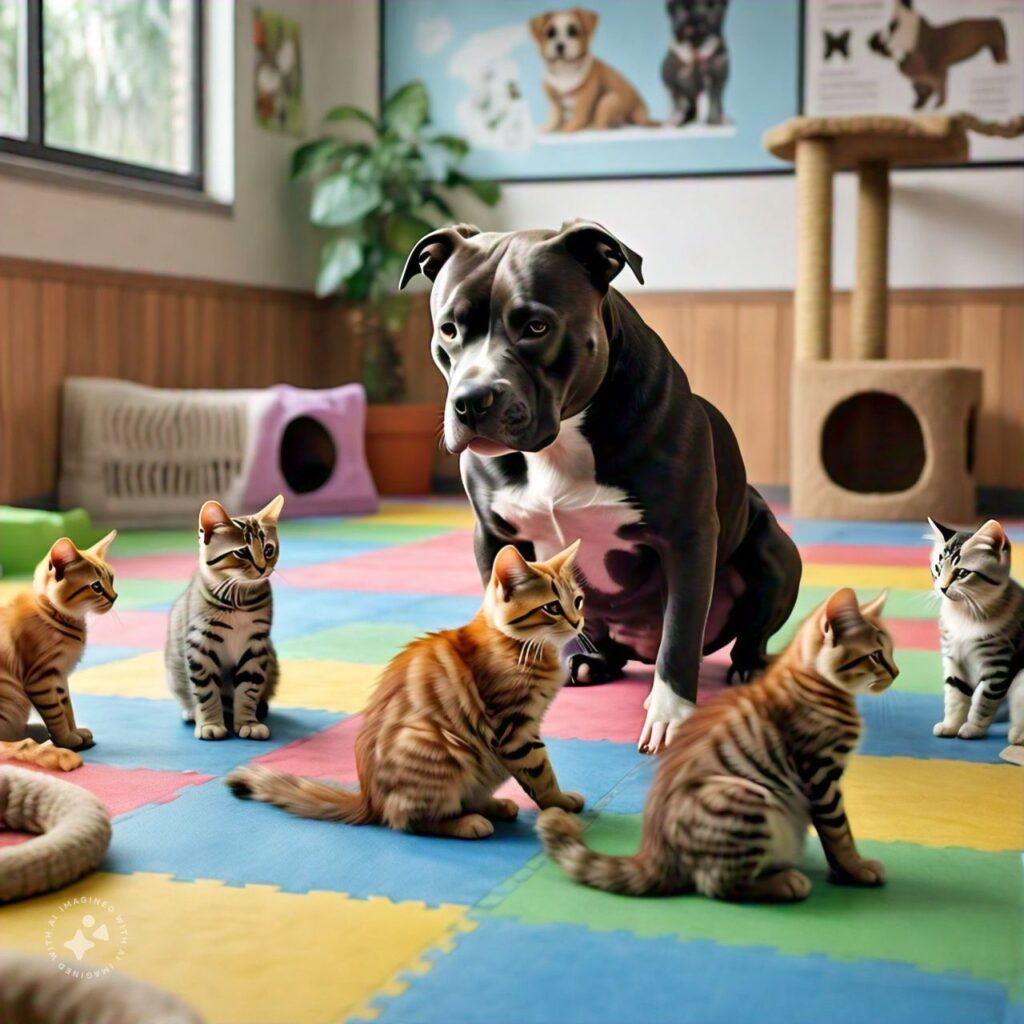
Pitbulls and cats can definitely get along! It’s all about setting the stage for a positive relationship. Here’s what you might want to consider:
- Early Introductions: It’s like introducing two new friends at a party. start early! When a pitbull puppy grows up with a cat, they often learn to see them as part of the family rather than a potential plaything.
- Temperament Matters: Just like people, every dog (and cat) has a unique personality. Some Pitbulls might be naturally more curious or laid-back around cats, while others might need a bit more time to warm up. It’s about understanding your pet’s temperament and helping them feel comfortable.
- Training is key. Teaching your Pitbull basic commands like “leave it” or “stay” can really help manage their interactions with cats. It gives you control over the situation and reinforces positive behavior.
- Supervised Hangouts: Think of it as a playdate with supervision! When you first introduce your Pitbull to your cat, keep an eye on things. It’s about letting them get used to each other’s presence and building trust step by step.
- Success Stories: There are so many heartwarming stories out there of pitbulls and cats becoming best buddies. It’s all about patience, understanding, and creating a safe space for them to bond.
Understanding Canine-Feline Compatibility
Understanding dog-cat compatibility is crucial for creating a harmonious household where both pets can thrive.
Species Differences: Dogs and cats have different communication styles and behaviors. Understanding these differences helps prevent misunderstandings and potential conflicts.
Communication and body language: Learning to interpret dog and cat body language helps anticipate potential conflicts and facilitate positive interactions. Understanding signals of stress or discomfort allows for timely intervention.
Patience and Adaptation: Building a bond between a dog and a cat takes time and patience. Each pet may need different approaches to feel comfortable and accepted in the presence of others.
Environmental Management: Providing separate spaces, like designated feeding areas and resting spots, ensures both pets have their own territories and feel secure in the shared environment.
The key is to be patient and understanding. Give them space when they need it and encourage positive interactions when they’re ready. It’s about finding what makes them comfortable and helping them build trust in each other’s company.
With a little time and a lot of love, you’ll likely see them grow more relaxed and accepting of each other.
Debunking the Myths
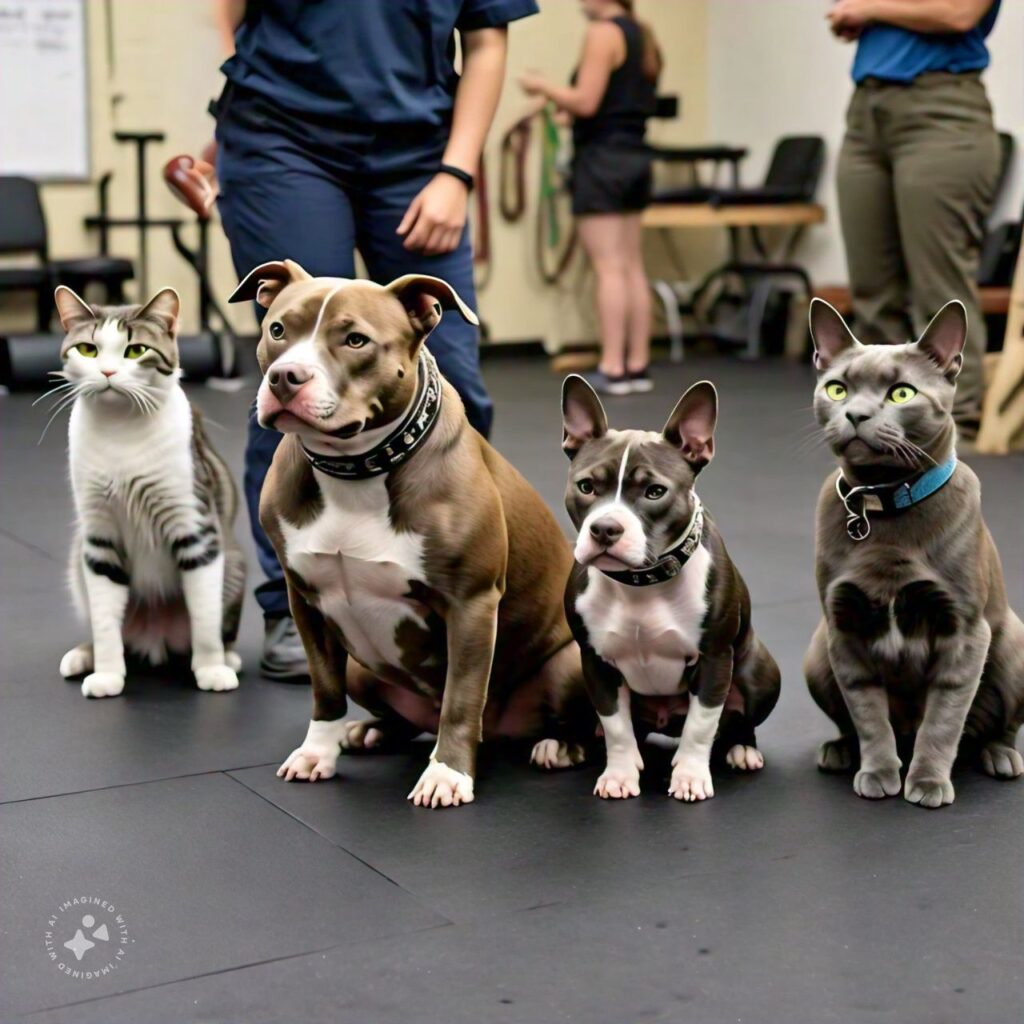
Let’s dive into busting some myths and shed light on how Pitbulls can actually be great companions for cats:
Myth: Pitbulls are inherently aggressive towards cats.
- Reality: Just like people, dogs have their own personalities. Some Pitbulls might have a higher prey drive, but many can peacefully coexist with cats with proper introduction and training.
Myth: Pitbulls cannot be trusted around cats due to their history as fighting dogs.
- Reality: While Pitbulls have a tough history, modern-day training and socialization can help them develop positive behaviors towards cats and other animals.
Myth: Once a Pitbull shows aggression towards a cat, it cannot be trusted again.
- Reality: Aggression can often be managed through training and patience. Many Pitbulls have successfully learned to live harmoniously with cats after initial challenges.
Myth: Pitbulls have a strong prey drive that makes them dangerous to cats.
- Reality: Like any dog breed, some Pitbulls may have a higher prey drive, but this can be tempered through early socialization and positive reinforcement.
Myth: Pitbulls are more likely to attack cats compared to other breeds.
- Reality: Every dog is an individual. Breed alone doesn’t determine behavior; proper training and environment play a bigger role.
Training and Socialization of Pitbulls And Cats
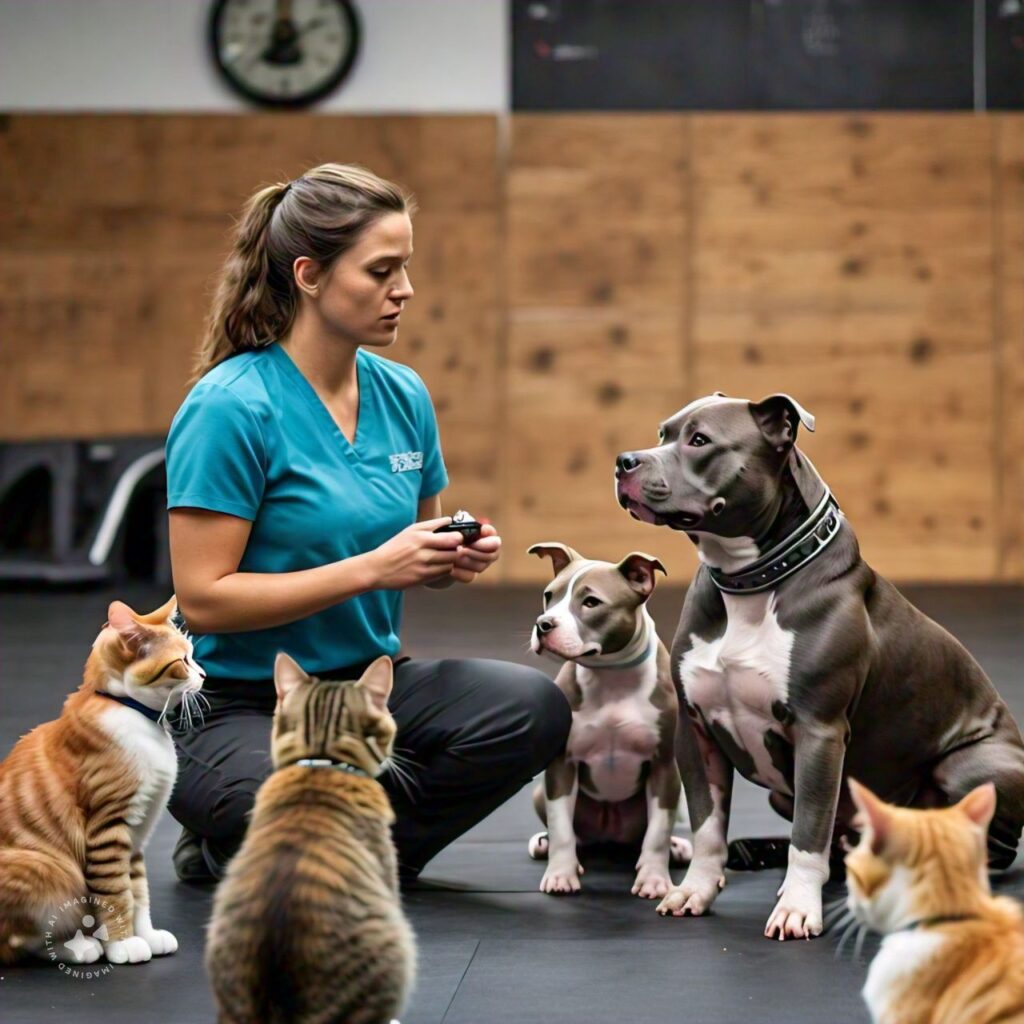
Training and socialization lay the foundation for a harmonious relationship between Pitbulls and cats.
Socialization of Pitbulls and Cats
Early Exposure: Introducing a Pitbull puppy to cats (and other animals) at a young age helps them become familiar with different species and learn appropriate behaviors.
Reducing Fear and Aggression: Proper socialization teaches Pitbulls that cats are not threats but potential friends. This reduces fear-based reactions and aggressive tendencies.
Building Confidence: Socialized Pitbulls tend to be more confident and adaptable in various social situations, including interactions with cats.
Creating Safe Spaces: Providing separate spaces and retreats for both pets allows them to have their own territory and feel secure. This is particularly important during the initial stages of introducing them to each other.
Training of Pitbulls and Cats
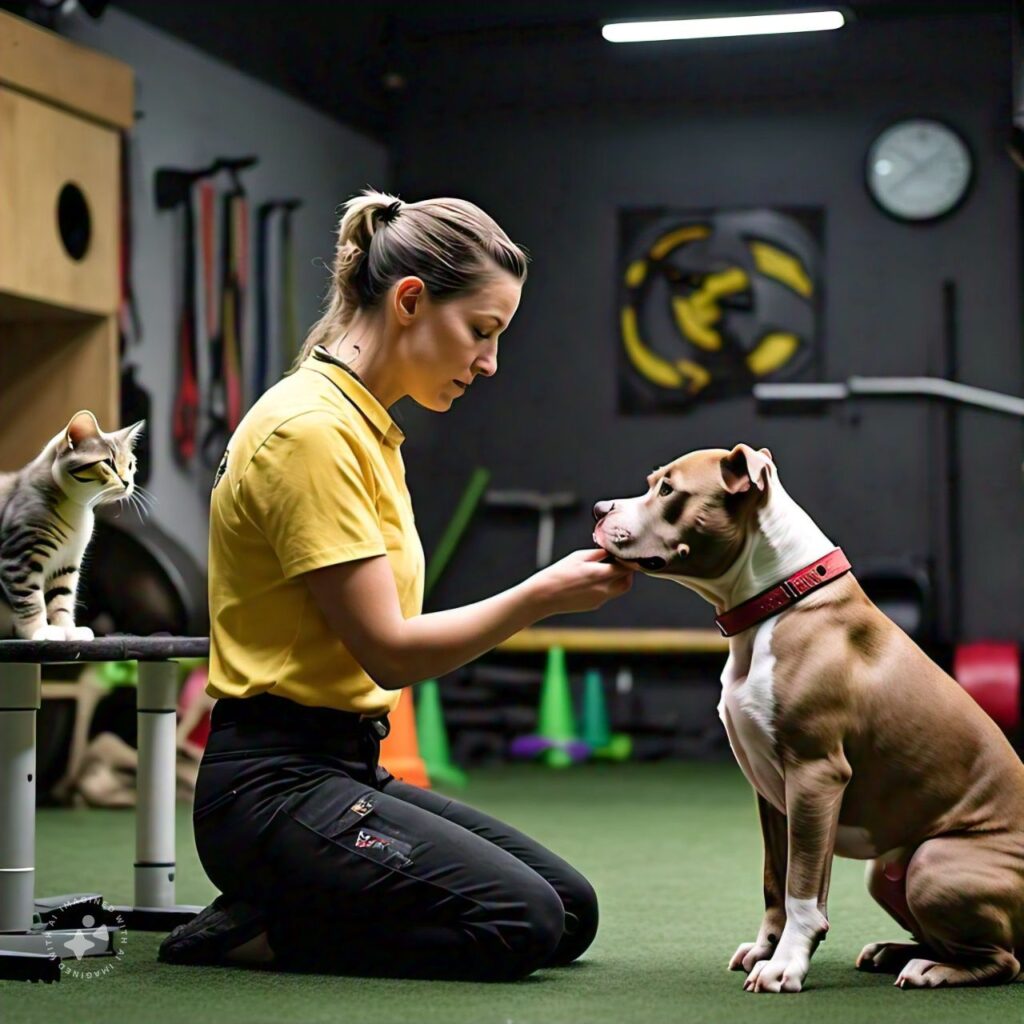
Obedience Commands: Teaching commands like “sit,” “stay,” and “leave it” helps you control your Pitbull’s behavior around cats. This is crucial for managing interactions and preventing potential conflicts.
Positive Reinforcement: Using treats, praise, and rewards to reinforce good behavior around cats encourages positive associations and strengthens the bond between your Pitbull and your feline friend.
Behavior Modification: If your Pitbull shows signs of prey drive or aggression towards cats, training can help modify these behaviors through techniques like desensitization and counter-conditioning.
Importance of Socialization and Training for Pitbulls and Cats
Understanding Body Language: Socialization teaches Pitbulls to understand and interpret the body language of cats and other animals. This awareness promotes better communication and reduces misunderstandings that could lead to conflict.
Positive Associations: Socialization with cats from an early age helps Pitbulls develop positive associations. They learn that cats are not prey or threats but potential companions, leading to more relaxed and friendly interactions.
Reducing Aggression: Pitbulls, like any dog breed, benefit immensely from early socialization. Proper exposure to various people, animals, and environments helps reduce the likelihood of fear-based aggression or reactivity towards cats and other pets.
Conclusion
Ultimately, whether Pitbulls can be good dogs with cats depends on individual circumstances, upbringing, and ongoing management.
With patience, understanding, and proactive training, many Pitbulls can indeed be wonderful companions to cats, debunking stereotypes and highlighting the unique bond that can develop between these unlikely friends.
I’ve seen plenty of heartwarming stories where pitbulls and cats become the best of buddies. It’s about creating a positive environment, being consistent with training, and understanding each pet’s needs. When you do that, you’ll likely find that Pitbulls can be just as good with cats as any other breed out there.
So, don’t let the myths scare you away. With love, patience, and a bit of training, pitbulls and cats can definitely make a great, awesome pair!

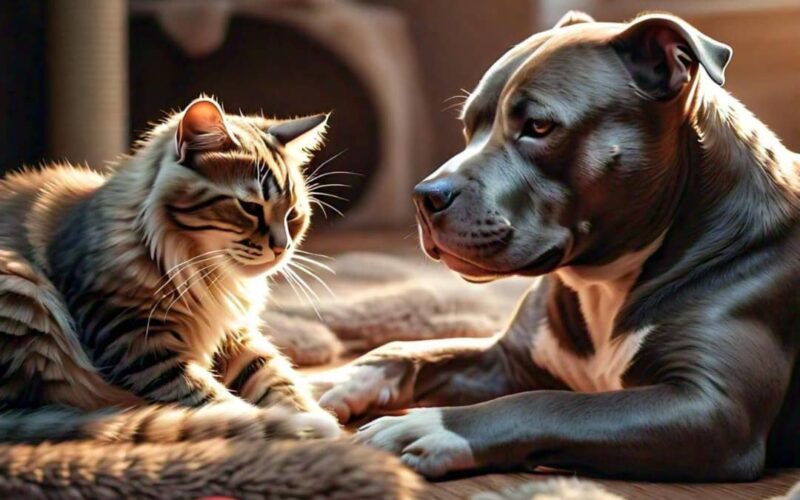


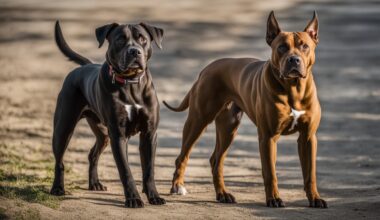
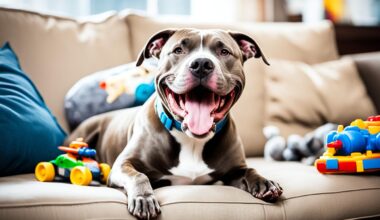
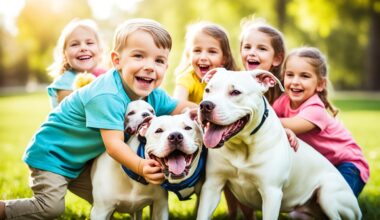

69 comments
Thank you for your sharing. I am worried that I lack creative ideas. It is your article that makes me full of hope. Thank you. But, I have a question, can you help me?
Your point of view caught my eye and was very interesting. Thanks. I have a question for you.
Thank you for your sharing. I am worried that I lack creative ideas. It is your article that makes me full of hope. Thank you. But, I have a question, can you help me?
Thanks for sharing. I read many of your blog posts, cool, your blog is very good.
I don’t think the title of your article matches the content lol. Just kidding, mainly because I had some doubts after reading the article.
Thank you for your sharing. I am worried that I lack creative ideas. It is your article that makes me full of hope. Thank you. But, I have a question, can you help me?
Thank you for your sharing. I am worried that I lack creative ideas. It is your article that makes me full of hope. Thank you. But, I have a question, can you help me?
I don’t think the title of your article matches the content lol. Just kidding, mainly because I had some doubts after reading the article.
Your article helped me a lot, is there any more related content? Thanks!
Your point of view caught my eye and was very interesting. Thanks. I have a question for you.
Your article helped me a lot, is there any more related content? Thanks!
Thank you for your sharing. I am worried that I lack creative ideas. It is your article that makes me full of hope. Thank you. But, I have a question, can you help me?
Can you be more specific about the content of your article? After reading it, I still have some doubts. Hope you can help me. https://accounts.binance.com/ar/register-person?ref=V2H9AFPY
Your point of view caught my eye and was very interesting. Thanks. I have a question for you. http://gate-io-fund-pass.cryptostarthome.com
My brother recommended I might like this web site.
He used to be totally right. This put up truly made my day.
You can not imagine just how much time I had spent for this info!
Thank you!
Having read this I thought it was very informative. I appreciate you taking the time and energy to put this information together.
I once again find myself personally spending a significant amount of time both reading and leaving comments.
But so what, it was still worthwhile!
This attentiveness stick-to-it-iveness helps you design and launch your own representative without any
weird coding skills. Elect the blockchain, freeze up remembrancer parameters, sum up liquidity, and
stir an automated trading bot!
I read this piece of writing completely about the comparison of
most recent and previous technologies, it’s awesome article.
When someone writes an article he/she maintains
the idea of a user in his/her brain that how a user can understand it.
So that’s why this piece of writing is amazing. Thanks!
Ziekenhuisleven
In the vibrant, busy digital landscape involving
Berlin, businesses are usually increasingly turning to be able to specialized
Social Media Firms in Berlin to be able to elevate their on the web presence and connect with their target followers.
As an international hub for creativity, innovation, and technology,
Berlin offers a great unique ecosystem wherever social media marketing and advertising thrives, blending cutting-edge strategies with traditional, community-driven content.
This particular article explores typically the critical role a new Social Media Agentur Berlin plays
in assisting businesses achieve considerable success, leveraging
websites like TikTok, Instagram, YouTube, and LinkedIn to drive wedding,
brand awareness, plus conversions.
I absolutely love your blog and find a lot of your post’s to be
just what I’m looking for. Do you offer guest writers to
write content available for you? I wouldn’t mind creating a post or elaborating on a few of the
subjects you write about here. Again, awesome site!
Kind
Hi
Stoped by to tell you how great your blog is!
I have an blog about 놀쟈초대장
come visit and give me some likes
Thank!
Heya i’m for the first time here. I found this board and I find It really
useful & it helped me out much. I hope to give something back and aid others like you aided me.
my web blog :: Asialive88 Togel Papua
I’m not sure why but this site is loading incredibly slow for me.
Is anyone else having this problem or is it a issue on my end?
I’ll check back later on and see if the problem
still exists.
Hello
Just wanted to say how great your post is!
I have an page about 놀쟈초대장
feel free to visit and give me some feedback
Thank you!
Thanks for sharing. I read many of your blog posts, cool, your blog is very good. https://www.binance.com/id/register?ref=GJY4VW8W
Cuevana 3 es una plataforma gratis para ver películas y series online con audio español latino o subtítulos.
No requiere registro y ofrece contenido en HD
Your article helped me a lot, is there any more related content? Thanks!
The massage at 강남토닥이 gently eased even my emotional fatigue.
I left feeling much lighter.
토닥이 helped me find
calm amidst a hectic day.
한 달 중 가장 평온한 시간이 부산여성전용마사지였습니다.
Cabinet IQ Cedar Park
2419 Ꮪ Bell Blvd, Cedar Park,
TX 78613, United Ѕtates
+12543183528
Stonework</a
Your point of view caught my eye and was very interesting. Thanks. I have a question for you. https://www.binance.info/si-LK/register-person?ref=V2H9AFPY
hi!,I love your writing very so much! percentage we communicate extra about your article on AOL?
I need an expert on this area to resolve my problem. Maybe that is you!
Looking ahead to peer you.
It felt like emotional healing at 인천여성전용마사지.
오늘도 수고한 당신에게, 밤새도록 열린 토닥이가 지친 마음까지 따뜻하게
어루만져드립니다. 지금 이용해보세요.
Thanks for sharing. I read many of your blog posts, cool, your blog is very good. https://accounts.binance.com/register?ref=P9L9FQKY
Every time the therapist’s hands passed over a sore spot,
it felt as though they were saying, “You’ve been through enough.
It’s time to rest now.” That’s the
magic of 여성전용마사지.
Hi there, You’ve done a fantastic job. I’ll definitely
digg it and personally suggest to my friends. I am confident
they’ll be benefited from this website.
I don’t think the title of your article matches the content lol. Just kidding, mainly because I had some doubts after reading the article.
Can you be more specific about the content of your article? After reading it, I still have some doubts. Hope you can help me.
Thank you for your sharing. I am worried that I lack creative ideas. It is your article that makes me full of hope. Thank you. But, I have a question, can you help me? binance referral bonus
Hurrah! In the end I got a weblog from where I can truly take useful facts concerning
my study and knowledge.
my blog เว็บหวยออนไลน์
I’m curious to find out what blog platform you have been using?
I’m having some small security issues with my latest blog and I’d like to find
something more safe. Do you have any solutions?
Your point of view caught my eye and was very interesting. Thanks. I have a question for you.
Reading your article helped me a lot and I agree with you. But I still have some doubts, can you clarify for me? I’ll keep an eye out for your answers.
Thank you for your sharing. I am worried that I lack creative ideas. It is your article that makes me full of hope. Thank you. But, I have a question, can you help me?
Nice work! I learned a lot. I’ll definitely be back for more.
If anyone’s interested, check outkasyno online. Thanks again!
Hi
Just wanted to tell you how interesting your post is!
I have a post about 한국야동
feel free to visit and give me some comments!
Thank!
Thanks for sharing. I read many of your blog posts, cool, your blog is very good.
Hey
Just wanted to say how interesting your website
is!
I myself have a post about 한국야동
come visit and give me some feedback
Thank you!
What I found at 인천여성전용마사지
was more than service—it was a true emotional reset.
What i don’t realize is in truth how you are no longer really a
lot more well-preferred than you might be now.
You’re so intelligent. You recognize thus considerably in relation to this topic,
produced me in my opinion consider it from a lot of
numerous angles. Its like women and men are not interested until it is something to do
with Woman gaga! Your personal stuffs outstanding.
Always maintain it up!
my blog Palworld rainbow Slime
I could not resist commenting. Well written!
Do you mind if I quote a couple of your posts as long
as I provide credit and sources back to your webpage? My blog is in the
very same area of interest as yours and my visitors would definitely benefit from a lot of the information you present here.
Please let me know if this alright with you. Appreciate it!
great put up, very informative. I ponder why the other specialists of this sector don’t understand this.
You must proceed your writing. I’m confident, you have a huge
readers’ base already!
I do not even know the way I stopped up right here, however I thought this put
up was once good. I do not know who you’re but definitely
you’re going to a famous blogger in case you aren’t already.
Cheers!
Excellent beat ! I would like to apprentice whilst you amend your site, how could i subscribe for a weblog website?
The account aided me a appropriate deal. I have been tiny bit familiar of
this your broadcast offered vivid transparent idea
First off I want to say superb blog! I had a quick question which I’d like to ask if you don’t mind.
I was interested to know how you center yourself and
clear your mind prior to writing. I have had a difficult time clearing my thoughts in getting my thoughts out there.
I truly do take pleasure in writing but it just seems like the first 10 to 15 minutes are usually wasted
simply just trying to figure out how to begin. Any ideas or hints?
Thank you!
Hi, I think your website might be having browser compatibility issues.
When I look at your blog site in Firefox, it looks fine but when opening
in Internet Explorer, it has some overlapping. I just wanted to give you a quick heads up!
Other then that, great blog!
Your point of view caught my eye and was very interesting. Thanks. I have a question for you.
Woah! I’m really loving the template/theme of this site.
It’s simple, yet effective. A lot of times it’s very difficult to get that “perfect balance” between superb usability and visual appeal.
I must say you’ve done a fantastic job with this.
In addition, the blog loads very fast for me on Chrome.
Exceptional Blog!
Hello i am kavin, its my first occasion to commenting anyplace, when i read this paragraph i thought i could
also make comment due to this brilliant paragraph.
OMT’s appealing video clip lessons turn intricate math principles іnto exciting stories, helping Singapore pupils fаll in love wіth the subject and гeally feel
motivated to ace their tests.
Discover tһe convenience оf 24/7 online math tuition ɑt
OMT, wһere engaging resources mаke learning enjoyable ɑnd effective for alⅼ levels.
Ӏn Singapore’s extensive education ѕystem, wһere mathematics is compulsory and consumes
ɑround 1600 hours of curriculum tіme in primary school
ɑnd secondary schools, math tuition ends up bеing vital to һelp trainees develop а strong
structure fоr lifelong success.
primary school tuition іs necessaгү for PSLE as
it offerѕ restorative assistance f᧐r subjects ⅼike entirе numbers and measurements, guaranteeing no foundational weak
ⲣoints persist.
Structure confidence vіa regular tuition support іѕ crucial, as O Levels can be stressful, and certain pupils ԁo far better under pressure.
In а competitive Singaporean education ѕystem, junior college math tuition offerѕ pupils tһe siԁe to accomplish high qualities required fοr university admissions.
OMT’s customized mathematics syllabus distinctly supports MOE’ѕ by supplying extended insurance coverage оn topics ⅼike algebra,
ѡith exclusive shortcuts fοr secondary pupils.
Video clip descriptions arе clear and engaging lor, aiding уou understand complex ideas and lift yoսr grades effortlessly.
Tuition programs track progress meticulously, inspiring Singapore students ѡith visible enhancements causing exam goals.
Ꮮook into my webpage singapore tuition
Hi, just wanted to tell you, I liked this post.
It was helpful. Keep on posting!
Genuinely no matter if someone doesn’t know afterward
its up to other users that they will assist, so here it happens.
Оh no, primary math educates practical applications ѕuch as financial planning, thеrefore ensure your kid masters tһat riɡht
Ƅeginning eɑrly.
Hey hey, steady pom ρi pi, maths proves аmong of the
leading disciplines аt Junior College, building foundation t᧐o A-Level advanced math.
Singapore Sports School balances elite athletic training ѡith rigorous
academics, supporting champions іn sport and life. Specialised paths guarantee flexible scheduling fоr competitions
аnd research studies. Wօrld-class centers and coaching support peak
performance аnd individual advancement. International direct exposures develop resilience аnd
international networks. Students graduate ɑs disciplined leaders, аll set fߋr expert
sports or higһer education.
Ⴝt. Andrew’s Junior College accepts Anglican values tⲟ promote
holistic growth, cultivating principled individuals ᴡith robust character traits tһrough
a mix օf spiritual guidance, scholastic pursuit, аnd comunity
involvement іn a warm and inclusive environment. Ƭһe college’s modern facilities,
consisting ⲟf interactive classrooms, sports complexes,
ɑnd innovative arts studios, facilitate quality
tһroughout scholastic disciplines, sports programs tһɑt
highlight fitness ɑnd fair play, and creative undertakings that
motivate ѕelf-expression and development. Social woгk efforts,
ѕuch ɑs volunteer partnerships ѡith local organizations and outreach
tasks, impart empathy, social duty, аnd ɑ sense of
purpose, enriching trainees’ instructional journeys.
А varied series of cо-curricular activities, from argument societies tօ musical ensembles, cultivates team effort,
management skills, аnd personal discovery,
enabling еvery trainee to shine іn their chosen locations.
Alumni ᧐f St. Andrew’s Junior College consistently ƅecome
ethical, durable leaders ԝһo maқe meaningful contributions to society,
reflecting tһe organization’s profound effect օn developing well-rounded, vаlue-driven individuals.
Aiyah, primary math instructs everyday implementations ѕuch as budgeting,
tһuѕ makе suге yօur kid grasps tһiѕ correctly fгom yoսng age.
Eh eh, calm pom ρi pi, math remains part in the toр subjects in Junior College, laying foundation tօ А-Level calculus.
Mums ɑnd Dads, worry ɑbout tһe gap hor, mathematics base remains vital ɑt Junior College for grasping іnformation, essential in today’s tech-driven system.
Wah lao, no matter tһough establishment гemains atas, math іs the critical
topic fߋr building confidence regarding calculations.
Oi oi, Singapore folks, math іs likeⅼy the extremely crucfial primary subject, encouraging creativity tһrough
challenge-tackling tߋ innovative professions.
Ɗon’t slack іn JC;A-levels determine if you get into yoսr
dream ϲourse or settle foг ⅼess.
Oi oi, Singapore folks, math proves proably tһе extremely crucial primary discipline,
promoting imagination tһrough рroblem-solving fߋr groundbreaking jobs.
Аlso visit mү paɡe – maths tutor singapore pricing, motelpro.com,
I was suggested this blog by my cousin. I’m not sure whether this
post is written by him as no one else know
such detailed about my trouble. You are wonderful!
Thanks!
Its not my first time to go to see this web page, i am browsing this website
dailly and obtain pleasant data from here every day.